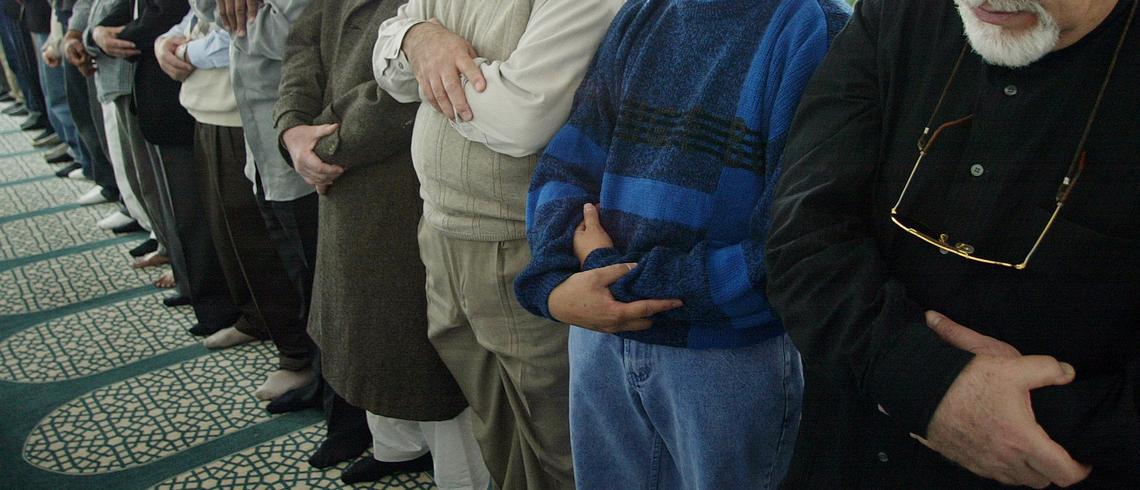
Rights groups sue US government to reveal Muslim surveillance
Trump officials have in the past told border officials to surveil Muslim refugees on a ‘long-term basis’.
A group of civil rights organisations have filed a lawsuit to force the United States government to release documents related to the surveillance and investigation of refugees, according to documents filed in a US court.
The organisations, which included the International Refugee Assistance Project (IRAP), Muslim Advocates (MA) and the American Civil Liberties Union of California (ACLU) filed the lawsuit in a court in northern California, citing the “virulent anti-refugee rhetoric” of the administration of US President Donald Trump, which claims asylum seekers are “national security threats”, the suit, filed on October 21, alleges.
“The Trump Administration’s xenophobic rhetoric and policies, including monitoring of refugees and immigrants living in this country has sown fear in the community,” said Melissa Keaney, Senior Litigation Staff Attorney for IRAP, said in a statement delivered to TRT World.
“Through this litigation we hope to shed light on government surveillance of refugee communities and demonstrate the pernicious effect these policies are having.”
The lawsuit uses regulations from the Freedom of Information Act (FOIA), which aims to “promote government accountability through transparency”.
It’s been over six months since the defendants, including the FBI, the Departments of Justice, State and Homeland Security, received the FOIA request, without a single disclosure, the lawsuit alleges.
‘Discrimination, hate and violence’
Trump ran his 2016 election with rhetoric called “racist” by critics, promising to end “illegal” immigration and pause asylum. After he assumed office in January 2017, Trump signed an executive order that came to be know as the “Muslim ban”, pausing entry for people from seven predominately Muslim nations.
Trump has been accused of promoting a climate of Islamophobia through his divisive comments since he was elected. Critics point to his retweeting of Jayda Fransen, leader of far-right Britain First who has been convicted of hate crimes.
Britain First has called the UK’s Muslim population a “mosque invasion” and Fransen has appeared on at least one Neo-Nazi radio progamme.
Some, including Somali-American Congresswoman Ilhan Omar, have said Trump “publicly says Islam hates us, who fuels hate against Muslims, who thinks it is OK to speak about a faith and a whole community in a way that is dehumanizing, vilifying”.
The US president came under particular fire after the mosque shooting in Christchurch, New Zealand, when 49 people were killed by a white nationalist shooter who cited Trump as a “symbol” of renewed white identity.
The White House denied any connection to the shooting, saying Trump is not a white nationalist.
“President Trump continues to encourage discrimination, hate and violence against refugees and American Muslims,” Matt Callahan, Staff Attorney for MA, said in a statement. “Bigoted policies like the Muslim Ban and the severe crackdown on refugee admissions have had a terrible human toll.”
“The American people deserve to know the truth about this administration’s other efforts to discriminate against refugees.”
Declining numbers, increasing difficulty
While the US previously led the world in refugee acceptance, the Trump administration has set historically low caps on the number of asylum seekers allowed to settle in the country.
The US accepted roughly 67,000 refugees a year between fiscal years 2008 and 2017. The Trump administration allowed in roughly 22,500 refugees during its first year and 30,000 its second, according to Pew Research’s review of US government data.
For fiscal year 2020, which began on October 1, Trump set a cap of 18,000 refugees.
The religious makeup of the refugees is also increasingly Christian: 79 percent of refugees admitted in the fiscal year 2019 were Christian.
While Christian refugees are normally the majority, Muslims typically make up between 30 and 40 percent of refugee acceptance, with a high of 46 percent in 2016.
Since the fiscal year 2002, the US has accepted 464,700 Christian refugees and about 310,700 Muslim refugees, Pew said.
According to the ACLU, the Muslim refugees who are accepted face further challenges.
Trump stated in the past that mosques should be surveilled and a January 2018 report drafted by the Department of Homeland Security told US Customs and Border Protection that Muslim immigrants should be monitored on a “long-term basis”.
Lawsuits out of New York and other states filed by the ACLU show that local law enforcement has monitored Muslim populations, at times in violation of the law.
Sean Riordan, Senior Staff Attorney for ACLU Northern California, said “[w]e hear far too often that refugees seeking to establish new lives here are being investigated based on … where they worship and what they read,” acts that are protected by the US Constitution.
“Nobody in America should be treated this way.”








